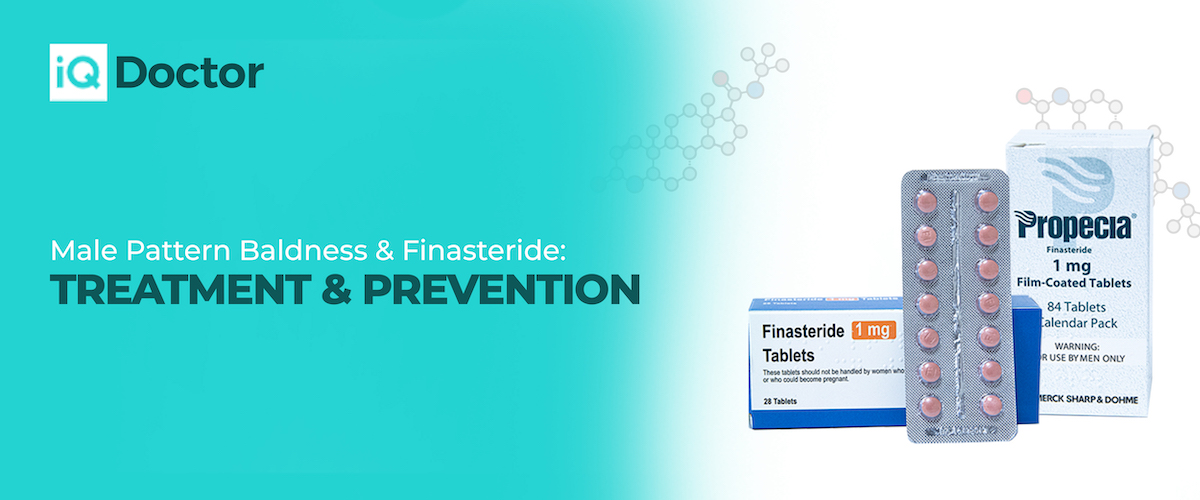Male Pattern Baldness & Finasteride: Causes, Treatment, & Prevention
07 April, 2021 | Holy Winter - Healthcare Writer

Are you tired of hiding your hair under caps and hoodies? Do you also fear social interactions and avoid hanging out with friends because you feel judged? Is hair loss taking the best of you? If your answer to all of these questions is yes, you have landed on the right page. The IQ Doctor Team is committed to improving your quality of life, one strand of hair at a time.
Dealing with male pattern baldness can be a chore. It comes with a lot of emotional baggage. Good healthy hair is a trademark set by society, co-relating to attractiveness. Men suffering from pattern baldness can quickly spiral into depression and stress.
As we know, male pattern baldness is a hereditary condition, and no one is at fault. We are constantly influenced by models and celebrities online and set extremely high standards for ourselves. We strive for unattainable perfection, not realising the toll it takes on our mental health.
Hair Loss Due to Male Pattern Baldness
Approximately 6.5 million men are affected by hair loss in the UK. According to the NHS, male pattern baldness affects almost 50% of men by the time they are fifty years old, and for many, the preliminary signs can even begin in their early 20’s and 30’s. The risk of male pattern baldness increases with age, with some people experiencing it as early as their teen years.
What is Male Pattern Baldness?
Male pattern baldness is also called Androgenetic Alopecia. Androgenetic refers to hormones like testosterone, and Alopecia means hair loss. It can be defined as the loss of hair starting from temples and eventually causing an M-shaped hairline. Later, the hair at the crown of the head begins thinning, and gradually, the bald patches from the crown and the temples meet in the middle, leading to partial or complete baldness.
There are forms of hair loss but with different patterns. Male pattern baldness is widespread. We all know someone going through it, whether it’s our favourite celebrities or close friends and family. It occurs when your body undergoes hormonal changes and results in the conversion of hair from terminal hair to shorter, thinner hair. Male hormones such as testosterone can be a major cause of Androgenetic alopecia. When testosterone in the presence of a 5-alpha-reductase gets converted into DHT (dihydrotestosterone), it causes thinning of hair. DHT makes hair shorter and lighter in colour.
Cycles of Hair Growth
The three stages of the hair growth cycle; the anagen (growth) phase, the catagen (transition) phase and the telogen (shedding) phase help us determine whether or not the hair follicle is healthy or shedding. Each hair follicle goes through these three stages in its lifecycle. When the hair follicle enters the shedding phase without going to the growth stage again, it causes hair thinning. DHT then reduces hair growth during the anagen phase.
Common Causes of Hair Loss
Several factors influence and cause hair loss—many of which we don’t have control over. Male-pattern baldness is mainly influenced by genetics. Research has identified several genes that control the process of hair thinning. One leading cause of male pattern baldness is unlucky genetics, and another is hormonal changes associated with the male sex hormone called androgens. Inherited baldness may not have severe side effects, but in some more severe cases, it can lead to thyroid problems, cancer, steroids etc.
Excessive hair loss can also lead to depression and stress, and vice versa. Stress can be highly destructive for the proteins in our bodies. Proteins, the building blocks of our cells, tissues, muscles and organs, are broken down prematurely. This unnecessary protein loss leads to hair loss, eventually making it thinner, shorter, and lighter.
Finasteride and iQ Doctor to the Rescue
Male pattern baldness affects every 2 in 1000 people in the UK. iQ Doctor brings you the solution to this seemingly never-ending problem. While there are several surgeries and transplants, medication is the convenient, cost-friendly and most effective way to deal with your hair loss. As a legally registered online pharmaceutical store, iQ Doctor, based in Birmingham, United Kingdom, is authorised by the Medicines and Healthcare products Regulatory Agency (MHRA) to sell medicines online. It is also registered with the General Pharmaceutical Council (GPhC) as an Internet pharmacy.
Currently, iQ Doctor provides a medicine called Finasteride, the only licensed prescription treatment available. It is also available under the brand name Propecia; Finasteride is a non-branded generic form that is cheaper. Unfortunately, Finasteride isn’t available on the NHS, and you can get it from iQ Doctor’s online clinic following consultation from one of its qualified representatives. iQ Doctor prioritises customer service, above all. They offer 100% confidentiality, discretion, and provide quick and easy delivery.
Propecia and Finasteride
Both Finasteride and Propecia have the same active ingredient; therefore, there is no significant difference between the two in terms of results. They inhibit the DHT production in the body, thus helping slow down hair loss. Since Finasteride is a generic version, it is cheaper, but Propecia is more widely recognised. These drugs can only be consumed orally and suitable for men aged 18 and above. The earlier you start taking your medication, the better the results.
Finasteride or Propecia should only be taken once a day. This medicine only helps cater to hair loss in men. It takes a few months to see visible results. The process may be slow, but it is worth it. Over 83% of the users found this treatment for hair loss compelling. You can easily order them from iQ Doctor’s website and also avail of free consultation.
Preventions of Hair Loss
In the light of getting fast relief and cost-efficient medicines, people tend to self-medicate, however, it is fundamental to consult with your healthcare provider before any self-medication. A consultation with your doctor will help you better understand if there are any risks involved or what is the correct amount of dosage required. It will also help you understand how the medication might react to your body type. Up till now, there are no common severe side effects of using Finasteride or Propecia. However, in some cases, individuals may experience sexual problems such as problems getting an erection, less interest in sex etc. These side effects improve with time, and in case they don’t, it’s advisable to consult your doctor immediately.
Some rarer side effects include pain or swelling in the chest area and stress and anxiety leading to depression. According to sources, less than 5% of men face side effects from using Finasteride or Propecia. You can also not take these medications if you have a prostate condition or if your partner is pregnant or trying to get pregnant. Individuals should continue taking Finasteride or Propecia regularly to maintain hair growth. If its use is discontinued, the hair growth is generally lost within a few months.
To get started on your hair growth journey, get in touch with iQ Doctor today!
Reviewed By

Omar El-Gohary
The superintendent and lead pharmacist - registration number 2059792.
Omar is passionate about developing healthcare technology to empower our patients.


